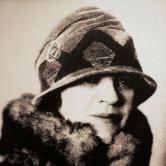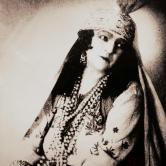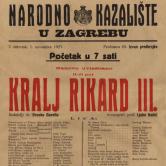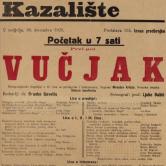Personage > Nina Vavra
Nina Vavra finished Miletić's Drama School in Zagreb, and her career in Croatian National Theatre started in 1899. She was one of the most famous actresses in her time. On stage she played a wide range of characters, from those in classical tragedies to the ones in modern drama. Her best performances include Cassandra from Aeschylus' play, Sophocles’ Antigone and Electra, Euripides' Andromache and Hecuba, and Racine's Phaedra. She used the pen name Ylajali to write rousing national poems. She also translated around 50 plays from Czech and German, and in 1907 wrote one herself, called Arrival of Croats. A local amateur theatre was named after her. She starred in Matija Gubec (1917) and Vragoljanka (Impish Girl) (1918)"In the early 1980s, a Chamber Theatre called Nina Vavra was formed in Križevci. It had about 20 members, mostly amateur actors who had their own Bulletin newsletter covering theatre and literature topics, and were performing Beckett's plays throughout the country.
Life of Great Artist Nina Vavra
On October 19th, 1939, as she celebrated the 40th anniversary of of her stage work in Croatian National Theatre, Nina Vavra gave an interview with Zagreb News, in which she talked about her private and professional life:
Everything is the way it should be: audience applauding, showing their respect and love! I've spent 40 years on stage! If only people knew, how hard it was! I've had numerous roles over the years, enjoying success and happiness, but I've also had my share of endless tears caused by injustice... Over four decades the actress has been playing numerous characters of mistresses, heroines, wretched women or sweethearts; she has been a symbol of freedom, beauty, a mother, a tragic person, an intriguing woman, and an old lady, and her performances are likely to remain unsurpassed!
"She attended Girl's Secondary School in Zagreb, and was the best student in her class. When she was 12, her aunt took her to see a theatre play. She didn't like it, so she decided never to go to the theatre again. Still, as fate would have it, she did return to it later on, when she took the entrance exam for the Zagreb School of Acting, and was the only girl to be admitted, thanks to her expressive interpretation of the poem Oj budi svoj (Oh, Be Yourself). She attended the School of Acting from 1896 to 1898. As a student she played a role in Henry IV, and she made her professional stage debut with great success in Scribe’s Ladies’ Fight. As a young actress, she had high hopes and expectations, only to get disappointed later on, when she got some experience in theatre life under her belt. She was told she would get a 50 forint salary per play, but she was paid only half the price plus additional 5 forints for her clothes and make up, "since she was a lady". When she was 24, she went abroad for the first time-she was the lead actress in Madasy’s Human Tragedy in Prague. She played in Hasanaginica, in Belgrade and Niš, Serbia, just before the War. She was given a special award by King Peter I of Serbia for her role in Nušić’s tragedy Autumn Rain. Only years of hard work had helped this proud an extremely talented lady climb the ladder of success. She seemed to capture the audience with her impressive performances, her wonderful voice, and the kindness of her heart. She also wrote a play. She didn’t dare to use her real name, so she used a pen name. In 1907, in a surge of patriotic ecstasy, she wrote a play in 5 acts, Arrival of Croats. During the premiere of her play, which was a major success in Zagreb, she casually took her seat in the gallery, pretending she wasn’t really interested in the play, since nobody knew she was the playwright. In 1908 Nina married a director and her close friend, Bach. They had been performing together for years. She went on writing novels, and newspaper articles, and translating about 50 dramas. In 1921, together with her colleagues from Zagreb, Osijek, and Belgrade, she established a theatre group in Split, which was very popular during the first year. She was given her first garland in Varaždin. Her stage career included over 500 different roles.
"On 25th and 26th of November, 1939 there will be a festive occasion in Zagreb Theatre, the curtain will rise to reveal Nina Vavra once again, playing in Euripides’ Trojan Women. Nina Vavra kept this occasion a secret. She wrote her review of this performance, as well as the tragedy itself, explaining her views of art and her stage life as a whole. It is worth a mention that Nina Vavra asked our prominent artist, Ivan Meštrović, to be a patron of this memorable event.





